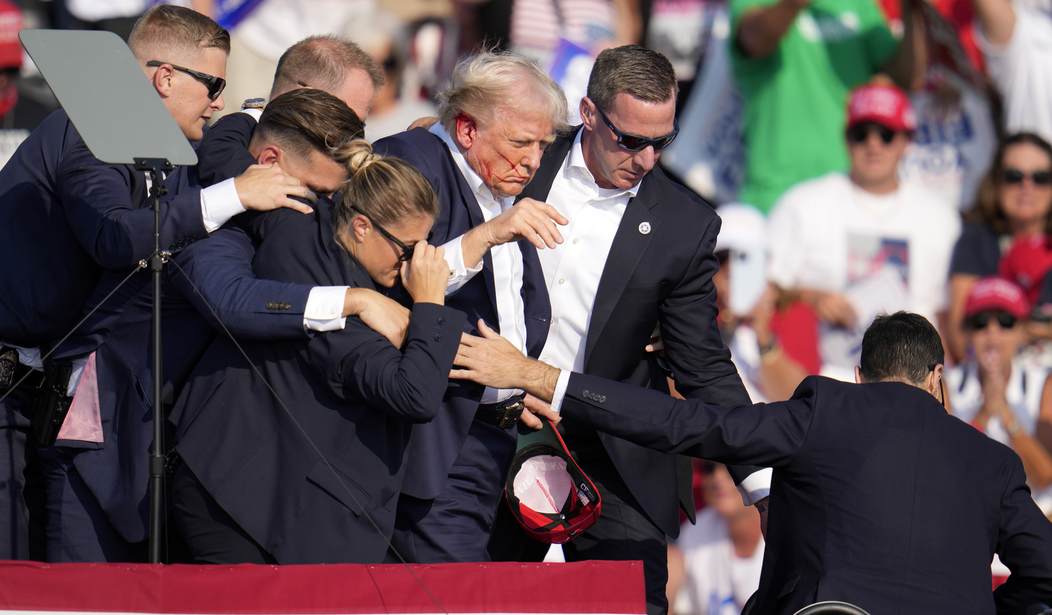Acting Secret Service Director Ronald Rowe testified before the Senate Judiciary and Homeland Security and Governmental Affairs Committees regarding the total and complete failure to protect former President Donald Trump at his July 13 rally in Butler, Pennsylvania. Trump missed a fatal headshot by millimeters, though a bullet grazed his right ear. The incident has become a source of extreme embarrassment for the Secret Service, who presided over what appears to be an epic breakdown of communications and security lapses that almost got Trump killed.
Acting Secret Service Director: I "could not, and I will not and I cannot understand" why the roof where the shooter carried out his attack on former President Trump was not secured. pic.twitter.com/gjK1WqrunJ
— Townhall.com (@townhallcom) July 30, 2024
CORNYN: Can you explain why the shooter's drone worked?
— Townhall.com (@townhallcom) July 30, 2024
USSS: There was no-counter drone system present. pic.twitter.com/5qgoWUlZAw
It cost Kimberley Cheatle her job after her shambolic testimony last week, where lawmakers on both sides grew increasingly frustrated with her non-answers over the incident. Yet, while Rowe appears to be a bit more forthcoming about the details of the assassination attempt, Susan Crabtree at RealClearPolitics had an article about Mr. Rowe being involved in limiting security resources to Mr. Trump despite repeated requests to enhance his detail, a position the agency denied but later had to admit was true. Crabtree’s reporting was mentioned during this hearing by Sen. Ron Johnson (R-WI). Rowe denied the allegation in the piece, but Crabtree stands by her sources.
"Okay, that's the kind of information you need to refute with documentation," replied Johnson.
We'll see if the Secret Service provides such materials in refuting this claim.
🚨🚨@SenRonJohnson asks Acting Secret Service Dir. Rowe if my reporting in my latest story, below, is accurate -- that he is responsible for limiting counter snipers to Trump and other events that are not drivable from D.C.
— Susan Crabtree (@susancrabtree) July 30, 2024
Rowe says the reporting isn't true: "That is a false…
Recommended
Acting Secret Service Director Ronald Rowe was directly involved in denying additional security resources and personnel, including counter snipers, to former President Trump’s rallies and events – despite repeated requests by the agents assigned to Trump’s detail in the two years leading up to his July 13 attempted assassination, according to several sources familiar with the decision-making.
Rowe succeeded former Secret Service Director Kimberly Cheatle, who resigned last week after bipartisan calls following her widely panned testimony before the House Oversight Committee. But both Rowe and Cheatle were directly involved in decisions denying requests for more magnetometers, additional agents, and other resources to help screen rallygoers at large, outdoor Trump campaign gatherings.
It was Rowe’s decision alone to deny counter sniper teams to any Trump event outside of driving distance from D.C., these sources asserted.
[…]
Johnson and other members of the committee are expected to focus on Rowe’s role in the Secret Service’s repeated denials of extra security requested by agents assigned to Trump’s protective detail and about decisions regarding the number of placement of snipers assigned to some of Trump’s events.
Assigning counter snipers based on the ability to drive to an event may sound far-fetched, but knowledgeable sources explained that there’s a limited number of these highly trained Uniform Division officers. It’s easier for counter sniper teams to carry their guns and gear in a van they can all use to transport the teams to the site for advance work for the event and then use the same vehicles, referred to by the Secret Service as “push vehicles,” to return to D.C.
The alternative is for counter sniper teams to board commercial flights or Amtrak (if the event is in the Northeast corridor) with all their gear, find a rental vehicle once on the ground, and then do it all in reverse on the way home. It’s all possible under the “needs of the Service,” one source contends, but in reality, it’s much easier and far more cost-effective for counter snipers to drive to and from a site.
“They can carry their guns and gear on airplanes – there’s an efficient process for that – but it’s going to be much easier, because they have all their gear with them, to drive rather than fly because then they have a push vehicle to take the whole team to and from a hotel to the site each day,” a source in the Secret Service Community told RCP. “They would always rather drive than fly.”
The Secret Service has not responded to several questions from RCP about decisions to deny or limit security resources and personnel, including counter snipers, to Trump’s events.
This hearing comes after damning text messages were leaked to The New York Times, showing the extent of the communications breakdown. Counter snipers knew about shooter Thomas Matthew Crooks almost 100 minutes before he opened fire on Trump. The thread is disconcerting since Crooks seemed to be a step ahead of the security apparatus at the event.
Local SWAT teams had previously spotted Crooks, providing photos and a description which got lost in the white noise. Members of this team also took responsibility for failing to secure the location properly which led to the assassination attempt, where one man, Corey Comperatore, a firefighter, was killed, and two others wounded.

























Join the conversation as a VIP Member